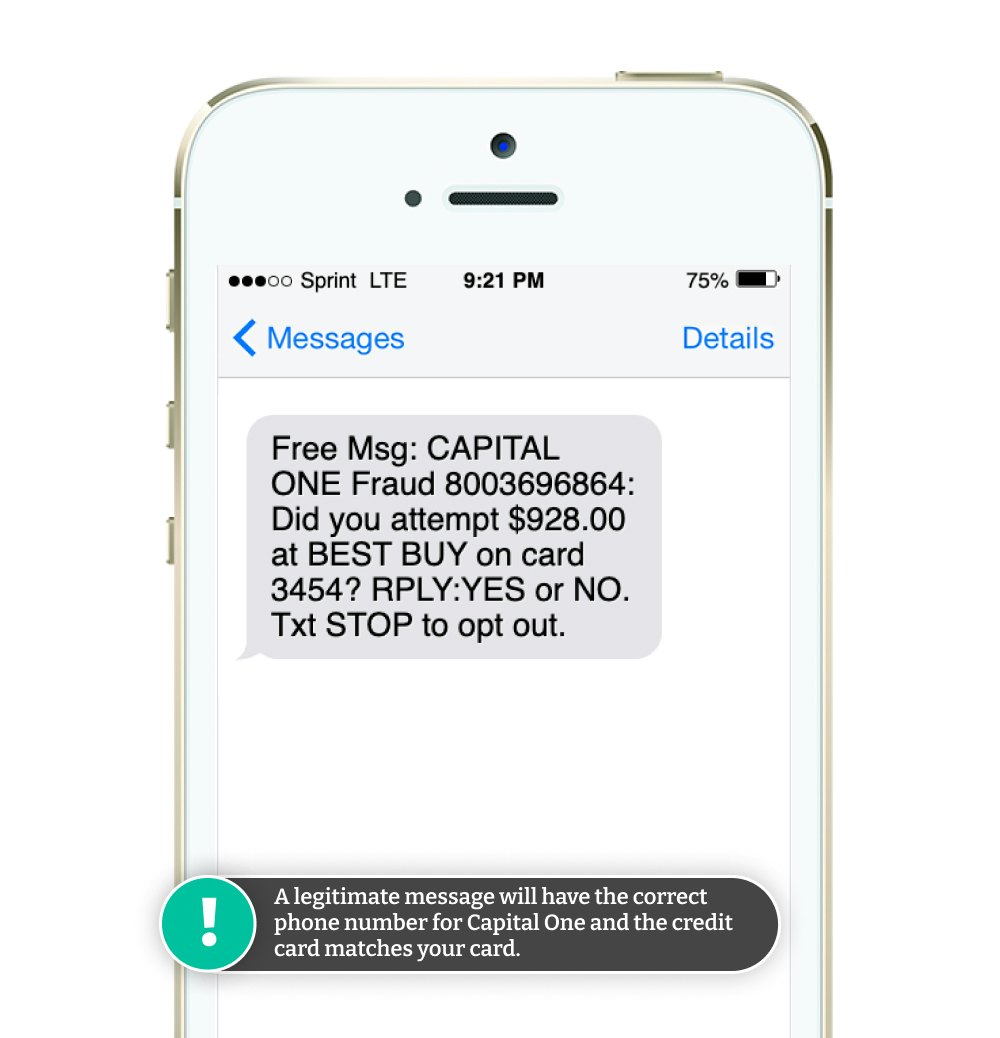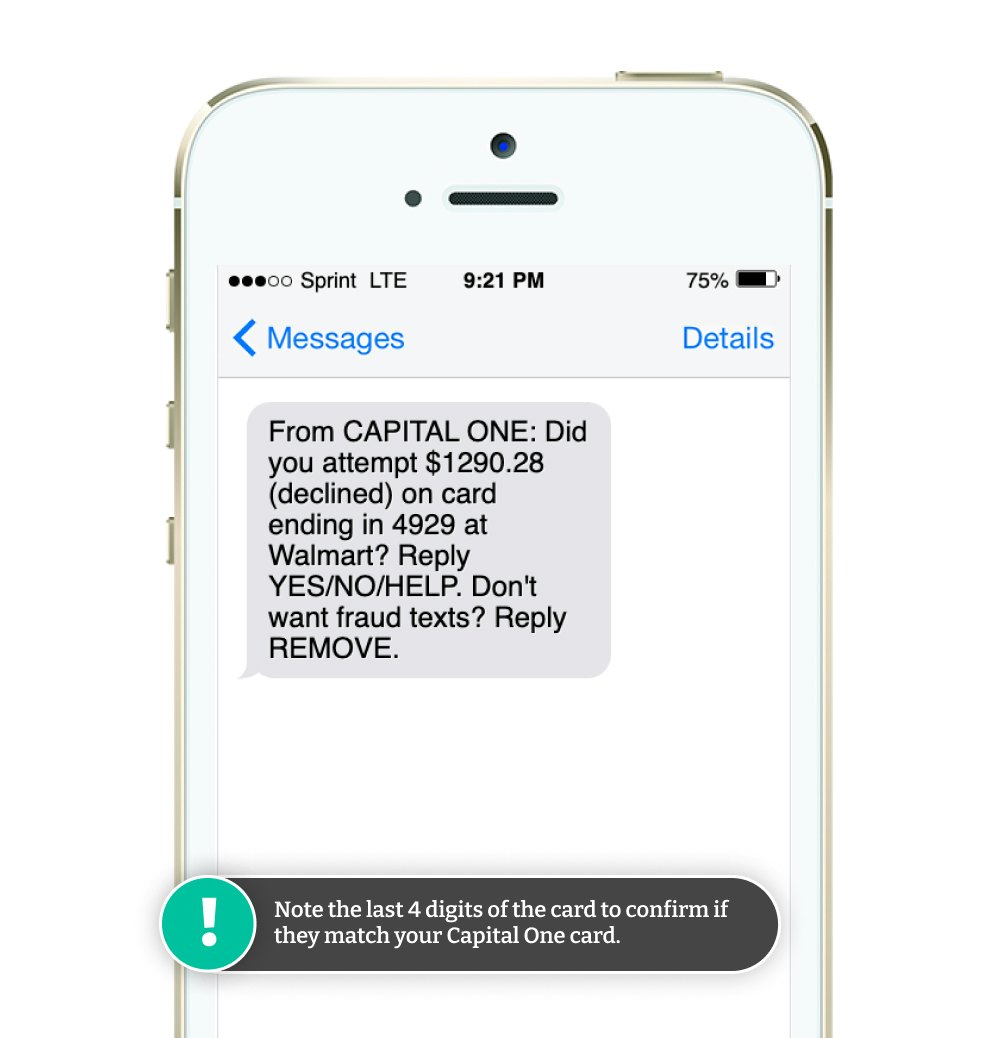- Real Capital One Fraud Text Alerts
- How to Spot a Fake Capital One Fraud Text
- How to Beat the Fake Capital One Text Scam
- How Capital One Asks For Personal Information
- What to Do If You Fall for a Fake Capital One Fraud Text
- Frequently Asked Questions
To verify any transactions which may be flagged as suspicious, Capital One bank sends its customers text alerts to verify whether the purchases are legitimate or not. However, Scammers have gotten very clever and have learned how to copy these alerts almost word-for-word, so it's important to know how spot the real messages from a fake Capital One fraud text.
Real Capital One Fraud Text Alerts
Capital One's fraud alerts via text message will always match your credit card number and won't contain a link to a website, just a phone number. Here's what they look like:

The differences between a real Capital One fraud alert and a fake one can be very subtle. If in doubt you should download the official app to cross check notifications with. If the notification does not appear in the app, it's likely the alert is a fake.
Capital One App Links: iOS App Store | Google Play
How to Spot a Fake Capital One Fraud Text
The main way to spot a fake Capital One fraud text is to look at the 4-digit reference number being referenced within the message. Typically, scammers won't have your exact card's details and therefore, the 4-digit number listed within the text will likely not match your card.
Be sure to cross check the number with all your cards or secondary cardholders to ensure the 4-digit number does not match your card, or any recently expired cards.

Example Scam Text MessageFrom CAPITAL ONE: Did you attempt $1290.28 (declined) on card ending in 4929 at Walmart? Reply YES/NO/HELP. Don't want fraud texts? Reply REMOVE.
How to Beat the Fake Capital One Text Scam
If you receive a text message and aren't sure if it's a real Capital One message, use these methods to avoid being the victim of a scam.
- Log into your Capital One account via their website or app directly to verify that the message was sent from them.
- Don't follow any links in the text or call the phone number listed.
- If you identify a text message as a scam message, delete the message immediately.
- Do not attempt to respond to the scammer or call them out on their scam.
- This will just flag your number as a real working number, and you may find yourself getting more scam messages.
Capital One
Website: https://www.capitalone.com/
Contact page: https://www.capitalone.com/help-center/contact-us/
Contact page: https://www.capitalone.com/help-center/fraud-disputes/report-suspicious-charge/
It's important to verify links and contact details to beat imposters.
How Capital One Asks For Personal Information
Capital One will never ask for sensitive account details by text, email, or phone. However, if they do call you, they will ask a few security questions to verify who you are.
If in any doubt, do not contact or call Capital One using numbers or links found within text messages or emails. Go to the official Capital One website and get their contact details from there.
What to Do If You Fall for a Fake Capital One Fraud Text
If you responded to a fake Capital One text alert, it's important to act quickly to minimize the damage.
Follow these steps:
- Call Capital One and report the fraud. They may cancel your cards and issue you new ones if your account is at risk.
- Monitor your Capital One account/s closely. Monitor your Capital One accounts for the next few months and report any suspicious transactions directly to American Express.
- Report the scam to the credit bureaus. If you gave your Social Security number (SSN) to the scammer, it's important to either freeze your credit or place a fraud alert.
- Protect your identity. You can never be too careful. An identity theft protection plan can put your mind at ease if you're worried about identity fraud (which can take years to recover from).
How to Report a Fake Capital One Text
To report suspicious messages to Capital One, take a screenshot of the message and send it to [email protected].
Be sure to include the sending phone number and the content of the message. After sending the information to Capital One, delete the text message from your phone.
Block Scam/Spam Texts
Your messaging app may have an option to block spam/scam texts from reaching your inbox. If not, there are several third-party apps that can do this for you and minimize the risk of falling for a fake Capital One text message.
Other Types of Scam Texts to Be Aware Of
Scammers are sending more and more scam text messages pretending to be from legitimate companies and banks:
- Amazon
- Amex
- Apple
- AT&T
- Capital One
- Chase
- Citibank
- Citizens Bank
- Fedex
- Navy Federal
- Netflix
- PayPal
- Truist
- UPS
- Venmo
- Verizon
- Walmart
- Wells Fargo
Don't click on links within these texts or call the phone number listed. You should always find the genuine number for the company on their official website.


Comments